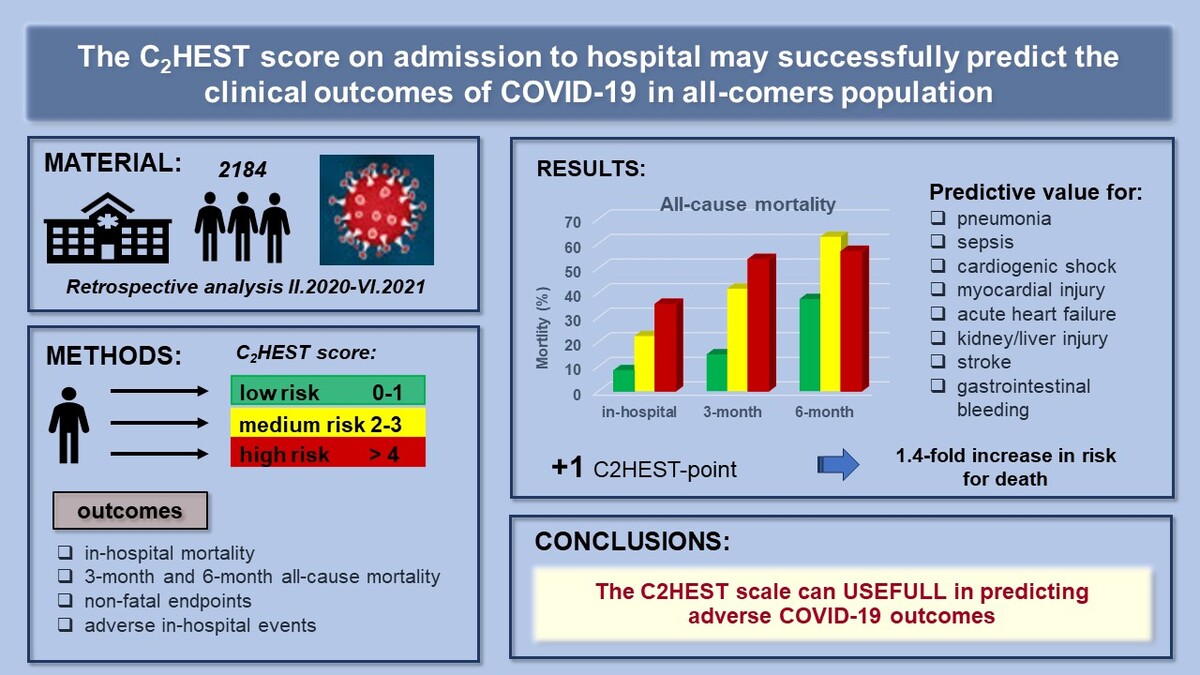Current issue
Archive
Manuscripts accepted
About the Journal
Editorial office
Editorial board
Section Editors
Abstracting and indexing
Subscription
Contact
Ethical standards and procedures
Most read articles
Instructions for authors
Article Processing Charge (APC)
Regulations of paying article processing charge (APC)
INFECTIOUS DISEASES / RESEARCH PAPER
The C2HEST score on admission to hospital may successfully predict the clinical outcomes of COVID-19 in all-comers population
1
Clinical Department of Internal Medicine, Hypertension and Clinical Oncology, Wroclaw Medical University,, Poland
2
Department of Cardiology, Faculty of Medicine,4th Military Hospital, Wroclaw University of Science and Technology, Poland
3
Wroclaw Medical University, Clinical Department of Diabetology and Internal Medicine, Poland
4
Statistical Analysis Centre, Wroclaw Medical University,, Poland
5
Wroclaw Medical University, Department of Emergency Medicine, Poland
6
Department of Cardiology, Provincial Specialized Hospital, Poland
7
Department of Emergency Medical Service, Faculty of Medicine, University of Science and Technology,, Poland
8
Medical Simulation Center, Faculty of Medicine, Wroclaw Medical University, Poland
9
Department and Clinic of Internal Medicine, Angiology and Physical Medicine, Faculty of Med-ical Sciences in Zabrze, Medical University of Silesia, Poland
10
Institute of Heart Diseases, Wroclaw Medical University, Poland
These authors had equal contribution to this work
Submission date: 2024-02-10
Final revision date: 2024-06-14
Acceptance date: 2024-07-02
Online publication date: 2024-07-28
Corresponding author
Małgorzata Trocha
Wroclaw Medical University, Clinical Department of Diabetology and Internal Medicine, Borowska 213 Str, 50-556, Wrocław, Poland
Wroclaw Medical University, Clinical Department of Diabetology and Internal Medicine, Borowska 213 Str, 50-556, Wrocław, Poland
KEYWORDS
TOPICS
ABSTRACT
Introduction:
Since the beginning of SARS-CoV-2-pandemic, intensive efforts have been made to identify predictors of COVID-19 outcomes. Individual components of the C2HEST-scale, used to predict the risk of atrial fibrillation, reflect comorbidities presences. Therefore, we hypothesized that the score could predict unfavorable clinical COVID-19-outcomes.
Material and methods:
2184-medical-records of subjects hospitalized at the medical-university-center due to COVID-19 from February 2020 to June 2021 were retrospectively analyzed . The subjects were categorized into low/medium/high-risk categories according to the C2HEST scale. Measured outcomes included: in-hospital-, 3-month- and 6-month-all-cause-mortality, the non-fatal hospitalization endpoints and other adverse in-hospital events.
Results:
A total of 598 deaths (27.4%), including 326 in-hospital (15%) were reported. All three types of mortality were highest in the high-risk C2HEST-stratum (35.4%, 54.4, and 56.9%), ,and lowest in the low-risk-stratum: (8.4%, 15%, and 37.5%), respectively. The receiver-operating characteristics revealed that C2HEST allows one to predict 1-month mortality with AUC30=70.7 and maintained at a similar level after 3- and 6-month-observation(AUC90=72.0 and AUC180=67). The p-value for the Log-rank test comparing survival curves was <0.0001. An increase of one C2HEST-point raised the overall death rate 1.4-fold. A change from the low- to medium category increased the death rate 3.4 times, while between the low- and high-risk-stratum the hazard-ratio was 5.0. The C2HEST-score also revealed predictive value for pneumonia, sepsis, cardiogenic-shock, myocardi-injury, acute heart failure, kidney/liver-injury, stroke, gastrointestinal-bleedings.
Conclusions:
The C2HEST-score is usefull in predicting adverse COVID-19-outcomes in hospitalized subjects. The simplicity of this scale, based on the presence of comorbidities, may address medical needs in risk stratification of COVID-19- patients.
Since the beginning of SARS-CoV-2-pandemic, intensive efforts have been made to identify predictors of COVID-19 outcomes. Individual components of the C2HEST-scale, used to predict the risk of atrial fibrillation, reflect comorbidities presences. Therefore, we hypothesized that the score could predict unfavorable clinical COVID-19-outcomes.
Material and methods:
2184-medical-records of subjects hospitalized at the medical-university-center due to COVID-19 from February 2020 to June 2021 were retrospectively analyzed . The subjects were categorized into low/medium/high-risk categories according to the C2HEST scale. Measured outcomes included: in-hospital-, 3-month- and 6-month-all-cause-mortality, the non-fatal hospitalization endpoints and other adverse in-hospital events.
Results:
A total of 598 deaths (27.4%), including 326 in-hospital (15%) were reported. All three types of mortality were highest in the high-risk C2HEST-stratum (35.4%, 54.4, and 56.9%), ,and lowest in the low-risk-stratum: (8.4%, 15%, and 37.5%), respectively. The receiver-operating characteristics revealed that C2HEST allows one to predict 1-month mortality with AUC30=70.7 and maintained at a similar level after 3- and 6-month-observation(AUC90=72.0 and AUC180=67). The p-value for the Log-rank test comparing survival curves was <0.0001. An increase of one C2HEST-point raised the overall death rate 1.4-fold. A change from the low- to medium category increased the death rate 3.4 times, while between the low- and high-risk-stratum the hazard-ratio was 5.0. The C2HEST-score also revealed predictive value for pneumonia, sepsis, cardiogenic-shock, myocardi-injury, acute heart failure, kidney/liver-injury, stroke, gastrointestinal-bleedings.
Conclusions:
The C2HEST-score is usefull in predicting adverse COVID-19-outcomes in hospitalized subjects. The simplicity of this scale, based on the presence of comorbidities, may address medical needs in risk stratification of COVID-19- patients.
Share
RELATED ARTICLE
We process personal data collected when visiting the website. The function of obtaining information about users and their behavior is carried out by voluntarily entered information in forms and saving cookies in end devices. Data, including cookies, are used to provide services, improve the user experience and to analyze the traffic in accordance with the Privacy policy. Data are also collected and processed by Google Analytics tool (more).
You can change cookies settings in your browser. Restricted use of cookies in the browser configuration may affect some functionalities of the website.
You can change cookies settings in your browser. Restricted use of cookies in the browser configuration may affect some functionalities of the website.



